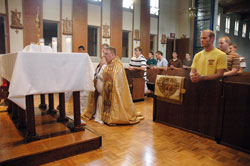‘Christ Our Hope’ helps secure future of parish, archdiocesan ministries

Father Robert Robeson, center, leads seminarians at Bishop Simon Bruté College Seminary in Indianapolis in eucharistic adoration on Aug. 21, 2008, at the seminary’s chapel. Father Robeson is the rector of the seminary. (File photo by Mary Ann Wyand)
By Sean Gallagher
“Christ Our Hope: Compassion in Community” is the annual archdiocesan stewardship appeal that occurs each fall.
It is a time for Catholics across central and southern Indiana to prayerfully consider and commit to supporting the threefold ministry of their parishes and the archdiocese in which the Gospel is proclaimed, the sacraments are celebrated and charity is given to those in need.
That support can be given both through volunteering in these ministries and financial contributions.
Earlier this month, archdiocesan Catholics who did not initially participate in Christ Our Hope received letters letting them know that there is still time to take part, and encouraged them to do so.
Two of the ministries that are supported by Christ Our Hope are directed to putting the future of archdiocesan parishes on strong footing.
Bishop Simon Bruté College Seminary in Indianapolis, which is currently giving priestly formation to 15 archdiocesan college seminarians, is supported in part by Christ Our Hope.
“We couldn’t do it without the resources that are available from … Christ Our Hope,” said Father Robert Robeson, rector of Bishop Bruté. “We benefit directly from that. We’re not like a parish [that is supported by a weekly collection].
“And yet, what we do affects every parish in a profound way. We’re basically training the leadership of our parishes, those who will serve as their priests.”
The rector said the college seminarians at Bishop Bruté are aware of the support they receive from Catholics across central and southern Indiana.
“We frequently pray for our benefactors, the people who support our ministry,” Father Robeson said.
Since he was appointed the first rector of the seminary in 2004, there have been more seminarians to offer those prayers.
Currently, there are 23 seminarians from four dioceses attending Bishop Bruté.
“I feel good about where we’ve come and where we’re going,” Father Robeson said. “It’s a sign of promise, a sign of hope for the future.
“I think, too, just the level of support that we’ve received from parishes and from priests has been a sign of hope. I think people recognize that priests are essential to the mission of the Church.”
According to Mary Schaffner, another important part of the Church’s mission for the future is getting more young adults involved in parishes.
“I find this generation of young adults to be very joyful, committed,” said Schaffner, who is the program coordinator for the archdiocesan Young Adult and College Campus Ministry. “They’re intelligent. They have a great respect for the Church.
“My sense is that if the invitation is there and the structure has been put in place and an intentional effort is put forth, this generation will actually be very good and open to [being active in parishes].”
Archdiocesan ministry to young adults in the past has taken place outside of a parish setting. This still occurs in such programs as Theology on Tap, in which young adults gather at downtown restaurants in Indianapolis to mingle and hear a presentation on the Catholic faith, and at the Bishop’s Bash, an event for young adults held last fall at the home of Archbishop Daniel M. Buechlein in Indianapolis that included Mass and a cookout.
Schaffner said there is a growing effort to help parishes and young adults come together.
“We try to work with the [parish] staff on how we can welcome and be more inviting to young adults to find a spiritual home in the parish,” she said. “And then [we work with] the young adults to become more active and engaged in their parish.”
Schaffner noted that many of these young adults are already deeply committed Catholics.
But she said there are a lot of young adult Catholics who are much less connected to their faith. It is these people that could be evangelized by young adults who are aided by the archdiocese’s Young Adult and College Campus Ministry.
Schaffner said that the young adults she works with are in a good position to lead their friends and fellow students or co-workers closer to the Church.
“What’s most important is that the Catholic faith is lived and that the people on the outskirts feel loved,” Schaffner said. “And if you read a lot of Pope Benedict’s stuff, he’s constantly talking about taking a very gentle and inviting approach. That’s the key.
“The beautiful thing about this generation is not only do they have the ability to be all of those things, but they also know their faith. They know who we are as Catholics and what we believe.”
(For more information about “Christ Our Hope: Compassion in Community,” log on to www.archindy.org/ChristOurHope.) †
